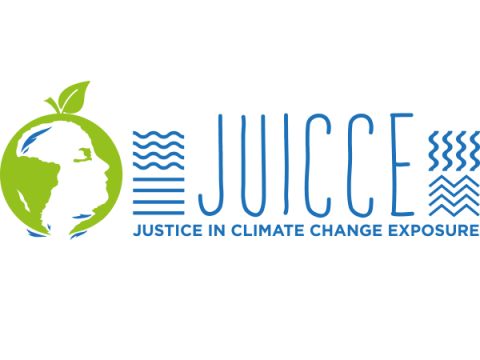
The JUICCE project launches its website
September 15 2025The JUICCE (Justice In Climate Change Exposure) project recently launched its new website, made possible thanks to support from AgroParisTech’s “Soutien à la science ouverte” (Support for Open Science) call for projects, of GS Biosphera and MSH Paris-Saclay. This new digital platform marks an important step in the dissemination of scientific knowledge on climate inequalities.
A project at the heart of contemporary climate issues
JUICCE is an innovative research project focusing on the analysis of climate inequalities in continental Europe, a crucial issue as the effects of climate change become increasingly significant. This scientific initiative takes an in-depth look at the unequal distribution of climate impacts, revealing how certain populations and territories are disproportionately affected by extreme weather events, temperature variations, and changes in precipitation. The project focuses in particular on understanding the social, economic, and geographical mechanisms that amplify these inequalities, thus providing an essential framework for public decision-makers and land-use planners. This interdisciplinary approach sheds light on environmental justice issues and guides climate change adaptation policies towards greater territorial equity.
AgroParisTech's commitment to open science
AgroParisTech has been implementing a proactive policy on open science for several years. Launched in 2023, AgroParisTech’s annual call for projects “Soutien à la science ouverte” enables the co-financing or financing of any initiative that is part of an open science approach. This initiative demonstrates the school’s strong commitment to promoting accessible, transparent, and collaborative research. The call for projects supports a variety of initiatives, ranging from the creation of innovative digital tools to the establishment of open databases and the development of new publishing methods. The JUICCE project fits perfectly into this approach by developing tools for disseminating and sharing scientific knowledge that go beyond the traditional boundaries of the academic community. This approach maximizes the societal impact of research by making scientific results directly usable by practitioners, local government officials, and citizens concerned with climate issues.
A website to democratize research
The launch of this website is much more than just a digital showcase: it is a powerful tool for democratizing scientific research on climate inequality. This innovative platform has been designed to meet the diverse needs of users, whether they are researchers, public decision-makers, journalists, or engaged citizens. The site offers an intuitive interface that allows users to explore research data from different angles, with interactive visualizations that make complex analyses of the geographical distribution of climate risks accessible. Beyond simple consultation, the platform promotes the appropriation of results by offering download tools, detailed methodological guides, and concrete use cases. This participatory approach creates an ecosystem of exchange where scientific knowledge directly feeds into local action and public policy.
The site will provide the following features:
- Present the scientific advances of the project in an educational manner, with visual summaries and explanations tailored to different audiences
- Share freely accessible datasets, algorithms, and methodologies developed, thereby promoting the reproducibility and extension of research work
- Facilitate exchanges and collaborations with the international scientific community by sharing news related to the project
- Raise public awareness of climate justice issues through editorial content, infographics, and field testimonials
- Offer decision-making tools for local actors facing the challenges of climate adaptation.
Towards a more open and collaborative research
This initiative is a prime example of AgroParisTech’s commitment to open science, an approach that goes beyond simply making data available to embrace a transformative vision of knowledge production and sharing. By supporting the JUICCE project, the school is actively contributing to the emergence of a new scientific paradigm based on transparency, accessibility, and transdisciplinary collaboration. This approach responds to civil society’s growing expectations for a more democratic science that is directly useful to citizens. It is also in line with international recommendations on open science, particularly those put forward by UNESCO and the European Union. The support provided to the JUICCE project thus demonstrates AgroParisTech’s strategic desire to position the institution as a key player in contemporary scientific debates on climate and environmental issues, while making a concrete contribution to building a society that is more resilient to the challenges of climate change.

